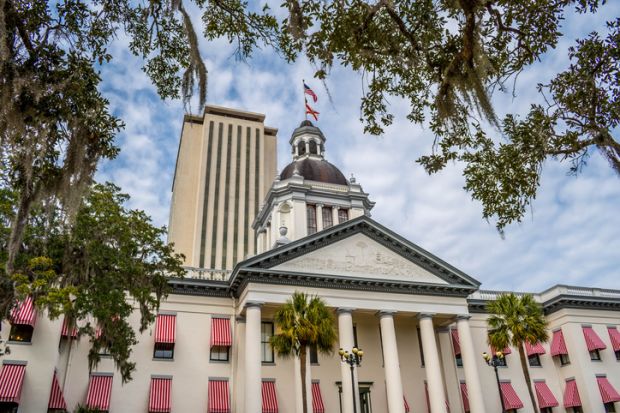New College of Florida, the public liberal arts institution undergoing a partisan overhaul by the state’s Republican governor, is reported to have resorted to aggressive and potentially illegal tactics to maintain and build enrolment.
The Sarasota Herald-Tribune, citing the institution’s own staff and faculty, described New College as lowering its academic criteria for admission for this coming semester, relying more heavily on athletic recruits, mischaracterising the institution’s resources, offering inducements such as laptops, and paying bonuses to recruitment staff.
A spokesman for New College described the institution as offering the bonuses to its recruiters, the newspaper said, even though the federal government has long prohibited the practice.
“High achievement deserves a reward, and increased pay will be implemented to recognise the diligent work of the admissions team in assembling this record-breaking class,” the spokesman told the Herald-Tribune. The spokesman later told Times Higher Education that he was quoted accurately, but said that added pay was given across the board at New College, and not conditioned on recruitment success. “To be clear, there are no bonuses or enrolment quotas tied to employee pay,” the spokesman told THE.
New College has recently become the centrepiece of efforts by Florida’s governor, Ron DeSantis, a 2024 US presidential candidate, to impose his partisan views across higher education. His agenda has included restricting teaching about the US history of racial division, banning initiatives to improve student diversity, and weakening faculty tenure.
With his heavy focus on overhauling New College, Mr DeSantis chose the smallest institution in the state university system, long known for excellence in the liberal arts that made it one of the nation’s top producers of Fulbright scholars. He accused it of harbouring leftist views, and replaced the majority of its trustees with conservative activists who fired its president and replaced her with a political ally, Richard Corcoran, a former speaker of the Florida House of Representatives.
The result has been an exodus of faculty ahead of the coming academic year. New College’s interim provost, Bradley Thiessen, has counted at least 36 departures, or more than a third of the faculty, heading into the autumn semester. Dozens of students also described plans to leave.
Mr DeSantis has mocked the fleeing academics, telling conservative activists that he welcomed the transformation. “If you’re a professor in like, you know, Marxist studies, that’s not a loss for Florida if you’re going on,” the governor told the annual meeting of the right-wing American Legislative Exchange Council in Orlando. “Trust me, I’m totally good with that,” he said.
Earlier in the month, Mr Corcoran announced that New College would have a record enrolment for this autumn, exceeding 300 first-year students. He attributed the gains to an emphasis on sports, saying that a third of the new students would be athletes. The college’s data also showed that its first-year enrolment of black students would rise 6 percentage points to nearly 10 per cent, and that male enrolment would jump 23 percentage points to nearly 54 per cent.
The Herald-Tribune report, quoting admissions staff speaking anonymously, said the increase was coming at costs that include using photos of a nearby university and presenting them as New College in marketing materials; accepting students with lower standardised test scores; and offering the admissions staff $5,000 (£4,000) bonuses for reaching the 300-student goal.
The US Congress in 1992 forbade colleges paying bonuses or other incentives to anyone based on their success in enrolling students, mainly because of abuses in the for-profit sector. The Department of Education later allowed exceptions for outside companies that provide student recruitment as part of a bigger package of services, although the Biden administration said earlier this year that the use of that exception has grown to the point where it might need to be reconsidered.
Register to continue
Why register?
- Registration is free and only takes a moment
- Once registered, you can read 3 articles a month
- Sign up for our newsletter
Subscribe
Or subscribe for unlimited access to:
- Unlimited access to news, views, insights & reviews
- Digital editions
- Digital access to THE’s university and college rankings analysis
Already registered or a current subscriber? Login








